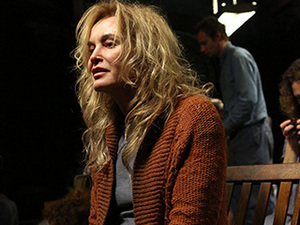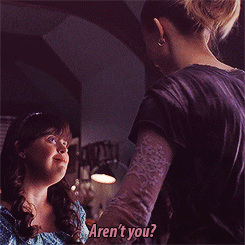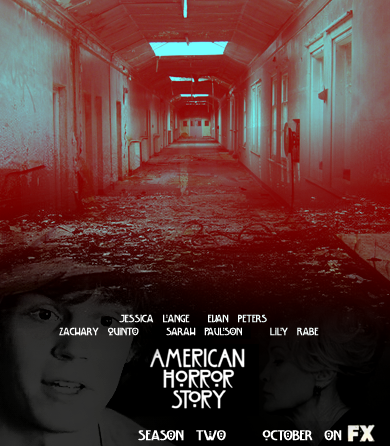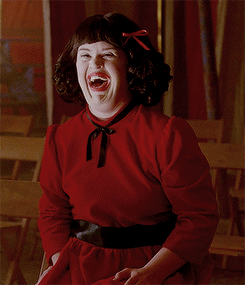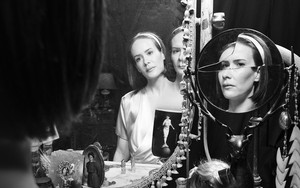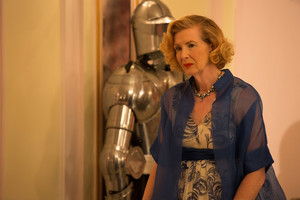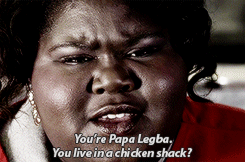Episode 12 | Aired Jan 16, 2013
Broken promises and shattered dreams abound as the survivors of Asylum horror move into the future in 'Continuum'
By Jeff Jensen at EW
Once there was a great society that tried to take hold in America. But some horrible things happened, and the story of our culture took the turns that brought us to today. I think we all know who’s responsible. That’s right: Those filthy freakin' aliens. Damn those shadowy monsters for turning the sixties into a boneyard of broken promises and shattered dreams! Damn those unsightly creatures for their hideous Otherness and unreasonable wants! Damn those weirdos for their queer ideas and strangelove ways! And most of all, damn them for the madness and destruction they inflicted on the members of the Kit Walker enclave, a would-be model of it-takes-a-village, can't-we-all-just-get-along mixed modern family esprit de corps. They could have been The New Normal. Instead, they became a tragedy. Damn you, aliens! A species-killing influenza pox upon you!
Of course, Alma saw it coming. In 1967, the year of Sgt. Pepper’s and Purple Haze and the Summer of Love, no one was more threatened by the extraterrestrials than Kit's first wife. After all, the ETs had abducted her, violated her, impregnated her, possibly killed her, and maybe resurrected her. Not exactly the best way to make a good impression. (Except maybe that last part.) For Alma, the ride aboard the aliens’ mystery mother-making ship was a close encounter of the Thredsonesque kind. It was a psychotic episode, a reality-rending break from the continuum of her life. And it was in the past. She wanted to leave it there, forget about it, and move into the future… albeit a future defined only by the safe, sheltered world she was building with her husband and their alien-hybrid child on their Massachusetts farm, and with another abductee victim-survivor, Kit’s Briarcliff soulmate Grace, and their alien-hybrid baby.
Which was a problem. Not necessarily because Alma had to share her husband with another woman. She was surprisingly okay with that. Or so she had convinced herself. The horror show had changed them, bonded them, and maybe enlightened them. The Walkers had enough Big Love to graciously, tolerantly, collaboratively co-exist with each other… to a point. And for Alma, that point was Grace’s attitude toward the aliens.
Unlike Alma, Grace didn't view the Grays as a painful memory that needed to purged, or as perverse powers who stole their freedom and degraded them into chattel. No: The aliens were a higher power, who had blessed them with new life and miracle children and a meaningful new form of communal living. More, these angelic creatures with their transforming magic offered her the hope of becoming something and someone better, a hope she sorely needed as she continued to be haunted by her original sin: The damning day she took an axe and CHUNKED! her sexually absusive father and complicit stepmother. It was as if Grace viewed the aliens as harbingers of the revolutionary social change -- or possibly even the agents of that change -- that was sweeping the nation. (Or trying to.) They were the future. And the future needed to be embraced.
Perhaps affected by this charged zeitgeist, Grace’s convictions had become zealously inflamed. She was spending lots of time sketching extraordinarily detailed charcoal sketches of “The Ductors” (her term) – a little too much time, from Alma’s point of view. Alma didn't think Grace’s scary images were appropriate for the children (but Grace so wanted the kids to know where they came from!), and perhaps viewed Grace’s artsy endeavors with resentment (stop your darkly dreaming doodling and help me with the domestic mule work!) and jealousy (you think you're better than me and more sophisticated than me, just because Kit thinks you’re “talented?!”).
At first, Alma thought that Grace’s behavior wasn’t a healthy, personal form of processing past trauma (Kit’s theory), but a kind of sick acting out, the byproduct of feeling neglected within the construct of their unusual living arrangement. (“She’s dwelling on the past because she’s unhappy in the present.”) The rules of the house were never spelled out, but Kit seemed to manage his relationships by assigning first position to Alma, his first true love and legally wedded wife. She was the one Kit kissed when the activist-community organizer came home from a hard day of plotting civil rights marches. She was the one he went to bed with at night. But Alma suggested that Kit needed to rethink his distribution of love wealth. He needed to tend to Grace’s garden. So to speak.
Was Alma truly so big-hearted/open-minded about Grace? Or was Alma starting to worry that she was losing rank to this progressive woman in the eyes of her progressive husband, and pushing Kit toward Grace was her way of remaining relevant and maintaining dignity, by making it look like it was all her idea? The question lingered as Alma listened to Kit and Grace begin to make love, her face blank to forlorn…
And then alienated Alma lost her head to the alien elements in her mind – the first of several women to do so in “Continuum.” As the Asylum lovers reconnected and Alma sadly eavesdropped, the electricity frizzed and lights blazed through the curtains – exactly the phenomenon that occurred prior to Alma's abduction three years earlier. Fear flooded her brain, clouding her consciousness. Her sensory experience electroshocked with surges of post-traumatic stress. Reality blurred. It is happening again. IT IS HAPPENING AGAIN. Kit and Grace, those Asylum forged soldiers, sprang into action. Kit grabbed a shotgun and defended the house. Grace secured the children and Alma, then extinguished the fire caused by the Molotov cocktail. No, it wasn't aliens. It was just Billy and The Bigots. (Just!) As Alma gathered her wits, Grace embraced her, tried to comfort her…
But nothing was ever the same again. Billy's hate crime had re-aggravated her psychic injuries and exacerbated her anxiety of the cruel, hostile world outside her now-shattered window. The delicate relational chemistry of the Walkers’ micro-commune had been altered. It was as if some kind of loss of innocence/fall from grace had occurred in their tiny patch of self-made Eden. Alma began to see Grace differently, and not for the better. Grace’s unique qualities and exotic quirks -- her alien characteristics, if you will -- were irritating, even threatening. There was Grace teaching her boy Thomas about his extraterrestrial heritage – in French – and there was Alma laboring alone in the kitchen, watching the lesson, looking perturbed. When Alma heard her daughter Julia whimpering in the next room, Grace moved to attend to her (I got the sense that Grace earned her keep by playing nanny), but Alma coldly shooed her back. Stay away from my kid, you rainbow-striped bead-sporting alien-loving hippy!
Grace could feel Alma’s bad vibes and called her out on it. An argument ensued. They vented their differing views about the aliens. Alma: “They were like little boys plucking wings off a butterfly!” Grace: “I don't believe that for a second. They are so far ahead of us. These children are living proof.” Then Grace said something that scared the s—t out of Alma, something which, in retrospect, might have been an insensitive miscalculation on Grace’s part, given the freakage Alma experienced several weeks ago during The Terrorism That Changed Everything: Grace told Alma that she wanted the aliens to return. She believed they would come back for the kids they helped create, and also for Kit, whom Grace regarded as some kind of enlightened yogi. “His mind is, like, so open, because incredible empathy for every living thing!” said groovy Grace, sounding quite Kool Aid-tipsy culty.
But Alma didn't want any more close encounters. And she didn't like Grace talking about her husband with such deep familiarity, like she knew him better than her. And so it got nasty personal. Alma said she liked life better without Grace, i.e. “before my husband brought home an axe murderer. … They locked you away for a reason.” Ouch. Grace parried, poking deep: “Well, at least I wasn’t the one locking herself away. Is that the way you want Julia to grow up? Ashamed of who she is?” A tense sequence that was made more edgy by cut-aways to Kit Walker chopping wood (and alluding to the episode’s cryptic cold open, when we saw Kit dressed in blood splashed undies and holding an axe dripping with gore) exploded when Alma drew back and slapped Grace across the face. Alma was immediately ashamed, and immediately wanted to take it back. She couldn't.
Enter Kit, cradling firewood, alarmed. “Let’s have a family meeting!” Way earnest.
“I’m done with family meetings,” said Grace, and huffed away.
That night, Kit left the bed he shared with Alma and sought out Grace. He found her by the fireplace, sketching aliens. She couldn’t sleep. Didn't want to. “I spent my whole life asleep, locked away,” said Grace. “So much time wasted. I don't want to waste another moment.”
“I understand,” said Kit.
“I know you do,” said Grace. It was clear that Kit and Grace had become the more compatible, complimentary partners in the Walker family's alien-brokered love triangle. Grace snuggled close, and told him the way things were, and the way things had to be – a mission statement of citizenship in the Tomorrowland that was nigh. “I love you, Kit. And Alma. And our sweet beautiful miracle babies.” She smiled huge. Happy. “My life here has been more precious than I could have dreamed. But something’s changed. I won’t live in fear and isolation. Not anymore. Not again. The future is coming, Kit. No matter what. We can't hide from it. We have to engage with it. We have to embrace it. Locked doors and shuttered windows won’t keep it out. Alma needs to understand that.”
Kit nodded. You're right. She does.
“We have to open her –“
Mind? Grace couldn't finish the thought, thanks to the rude intrusion of an axe blade into her back. It was Alma. She had shockingly -- somewhat unbelievably -- psycho-snapped and broken bad. CHUNK! She raised the axe and CHUNKED! again. Blood geysered. Grace began to gag and choke. Kit tackled Alma, pinned her to the ground, asked her to explain herself. Alma, her logic so severe, her terror so heartbreakingly unreasonable, everything about her now irrevocably mad: “She wanted to bring them back into our home and I couldn't allow it! We have to hide, we have to hide, we can't die…”
Kit left Alma to her twitchy deterioration and crawled to Grace, who was gurgling and bleeding out. He gave her a goodbye kiss, then extracted the axe from her back. He shuffled shell-shocked to his man of the house chair, took a seat, and presided over the death throes of a fragile dream. Grace lost her life for the second time, and Alma lost her mind for good. And ultimately, that could only take her, and us, to one place…
Briarcliff Manor Sanatorium.
April 4, 1968. Maybe.
In the common room, Judy Martin was leading a rousing game of Candyland with a group of fellow unfortunates, including the pinhead we all believed dead, Pepper. Yes, it was a continuity error -- our first clue that noggin-fried Judy’s experience of reality was irreparably busted. On the television, President Lyndon B. Johnson, that would-be Great Society engineer, was breaking into some goofy TV show to inform the nation that another Mountaintop dreamer, Marin Luther King, had been murdered in Memphis. Few of the lunatics paid any heed. Besides, they had become hardened to the trauma of dream destruction. It was all about keeping comfortable until the end.
“Percy, knock it off!” Judy barked at the inmate pounding on the telly in hopes of… improving its reception? Shutting it down? Protesting its horror? Judy told Pepper: “His Lithium levels are way too high. Dr. Miller should check him. Okay?” Judy's newfound Mother Hen care for the Briarcliff unfortunates was touching. But it was also as if she thought she was still Sister Jude, chief administrator of Briarcliff, and (Sgt.) Pepper was chief lieutenant Frank. Another clue to Judy’s unraveling mind?
She certainly wasn’t herself. Not even legally. Monsignor Timothy had her renamed “Betty Drake” after offing Judy Martin with a paperwork suicide back in 1965. (Betty Drake = Betty Draper of Mad Men + Betsy Drake, Cary Grant's actress-turned-psychotherapist third wife?) When Father Howard entered the common room and asked for a private word with the woman he held prisoner, Judy Martin, the woman who wasn't there, gave him a veryveryvery tiny taste of his own meds by petulantly pretended he wasn’t there, either. Touché. Still, Terrible Tim managed to drag “The Queen of Candyland” away from the game board in order to give her a news flash of his own. The upwardly mobile, Pope-aspiring priest had finally been appointed Cardinal of New York. “Good for you,” Judy snarked, firing up a cigarette. “You had a dream and you made it come true.” In the background, LBJ wrapped up on MLK, and the TV returned to laugh track-enhanced amusements.
Father Howard had more breaking news. The Church had donated Briarcliff to The State, which intended to turn The Asylum into a prison system “overflow” facility for mentally addled criminals. (Metaphorical read: Here endeth the era of monolithic religious institutions and everything they meant… if they meant anything at all.)
Oh, and one more thing: Monsignor Timothy had submitted the paperwork for “Betty Drake’s” release. “The cruelty ends here,” said the Monsignor, as if he had nothing to do with it.
But Judy was so far past that. “The cruelest thing of all, Timothy,” she said, “is false hope.”
“I promise,” said the priest. “I will make you a believer.”
He didn’t, of course. And in his small, veryveryvery tiny defense, it’s quite possible that Judy’s eroding mind was playing tricks on her. Which to say, he may never have made the promise at all.
We cut to a scene in the bakery, as newly secularized Briarcliff welcomed its first influx of jail-surplus unfortunates, rolling in like an immigrant tide, like a veritable alien invasion. We heard Jimi Hendrix druggy-jamming on the radio (There must be some way out of here/Said the Joker to the Thief), and we saw Judy lock eyes with a familiar figure emerging from a puff of cigarette smoke and hazy sunshine. The woman, played by Francis Conroy and named "Vera" according to F/X, was a dead ringer for the otherworldly Shachath, the angel of death… if Shachath had lost her black wings and femme fatale glam and given herself a makeover that was equal parts hag horror Joan Crawford and Matt Dillon in Rumble Fish. FUN FACT! In an episode featuring lady axe murderers and Jessica Lange in a straight-jacket, I have to think “Continuum” was winking at the 1964 camp-chiller Straight-Jacket, starring the aforementioned Crawford as an axe murderer, and an example of the “Psycho-biddy” subgenre. Also see: Whatever Happened To Baby Jane?, Whatever Happened To Aunt Alice?, What’s The Matter With Helen?, and Whoever Slew Auntie Roo? (Clearly, a golden era of horror.)
If I was even a quarter of the Susan Sontag wannabe that I want to be, I might be able to deconstruct Vera's campy-creepy visage with some kind of intelligence… or know enough to know that I shouldn’t. But I pseudo-intellectually digress-punt. Vera the black-eyed dye-job greaser was (I think) a former slumlord who stole government checks from the riff-raff who refused to pay their rent. (She also killed said loafers, too.) From the second she walked into Briarcliff accompanied by two thuggy dames -- a goofy-menacing Batman TV show baddie backed by Goon 1 and Goon 2 -- Vera acted like she owned the joint, and she made sure the Queen of Candyland knew it. She gave "Betty Drake" an ultimatum: Share power or die.
Judy was spooked, largely because she was certain that the scary lady threatening her life was actually Shachath in disguise, come to claim her soul. But that made no sense. Shachath only stalked to hopeless, and Judy had hope. The Monsignor was getting her out. He promised! Happily ever after loomed!
Her fear intensified – and her deterioration escalated – when she learned she had to share quarters with Vera. “Everything in this cell belongs to me,” the draggy dragon lady announced from the top bunk. “That includes you.” She told Judy she would soon have her “shakin’ and moanin’.” She told just-say-no Judy she would make her change her tune. The build toward Caged Heat went next level the next day in the common room, when the new Bad Woman on Campus bullied poor Percy, then shivved him to death, then blew Judy a kiss. The frazzled former First Lady of Briarcliff clutched her head, as if trying to keep it together. There was a fade to black…
And when Judy came out of it, Shachath was on top of her, although it was Vera’s voice who said, “Give me a kiss, sweetheart.” Judy went Alma: She snapped, broke bad. “Get away from me! I don’t want to die!” She pushed the woman away, and began to violently beat on her, and when the orderlies pulled her away, Judy saw she wasn’t beating on Shachath or Vera, but someone else altogether, a frumpy female inmate heretofore unseen.
Huh?
When we next saw Judy Martin, it was her turn to go Grand Dame Guignol. Pale skin. Longer, scraggily hair. Bloodshot eyes and wasted face, and of course, the straightjacket. She was struggling to get her bearings. She was in her office at the top of the Stairway to Heaven…
No, wait. She hadn’t had an office in years. Not since she was Sister Jude. Judy focused. Get it straight. This was her old office, now occupied by one Dr. Miranda Crump. Briarcliff’s reigning administrator informed Judy that unless she made a better effort to get along with her roommates – she had gone though five in the past two months alone – she was going to be sent back to solitary. Judy’s eyes squished with confusion. Five roommates? In two months? But it had only been a few days since Timothy Howard promised to work on her release! Surely Dr. Crump was mistaken! But no: It had actually been two and a half years since the Monsignor left Briarcliff. Judy protested. She asked Dr. Crump to fetch Pepper. The Pinhead would clarify everything. No, that was impossible: Pepper had died in the winter of 1966, well before the events of this episode. “Don’t you remember?”
Judy didn’t.
We were left to wonder: Was Vera even real? An expression of Judy's anxiety and alienation, dressed by her pop-hazed imagination? A composite character who embodied all of her former roommates, and of what Briarcliff was doing to her? Destabilizing her. Degrading her. Violating her physical and psychic boundaries. Threatening to completely destroy her...
Dr. Crump gave the woman she knew as Betty Drake a look full of pity. She told her not to worry. She told her she’d ask Dr. Creighton to increase her drug dosage. “Everything is going to be all right,” promised Dr. Crump. Judy looked to the glass pitcher and saw her reflection turned upside down in the water. Perhaps she was remembering something she once said about false hope. Or maybe that memory had also been lost in the discontinuous mess of her mind.
"Betty Drake" wasn’t only one who had become an unreliable narrator to her life’s story. Moving into 1969, American Horror Story re-introduced us to Lana Winters, born again as a Feminist heroine and blossoming brand name in the burgeoning field of True Crime literature thanks to her best-selling book Maniac: One Woman's Story of Survival. Her success was well deserved, for sure. But as we watched and listened as Lana read from her ripely written opus during a signing at Newman's Books, we began to sense that something unseemly has seeped into Little Miss Damn Plucky. And for all of us who had tracked and suffered her ordeal right along with her, we could tell that there was something flawed in her written recollection of playing Mommy to Dr. Oliver Thredson while chained in his bloody basement dungeon.
How long had it been? 20 minutes? 20 hours? 20 days? In a windowless room without a clock, time felt like a luxury I couldn’t afford. I reminded myself that any moment now, my time could end, and all the minutes I could extract with my lies and my shows of affection and empathy could slip through my grasp like sand through my fingers. CLICK! CLICK-CLICK! The fluorescent lights flickered on. Adrenaline coursed through my body. My muscles tensed. My heart pounded through my chest. His appearance was always unexpected. I came to believe he was always watching me, waiting to catch me off guard.
But this time, there was more than one coming down the basement steps. Another woman -- her hands tied behind her back -- staggered in front of him. She stumbled down the steps and landed hard on the tile floor. She looked up at me, and it was as if I was looking in a mirror and saw my own despair. That’s when he turned to me and said, "Say 'Hi' to our new toy."
Yet that never happened. Just ask Dr. Oliver Thredson, who suddenly stood up from his seat and called "Bullshit!" on the woman who killed him in the previous episode. "You told me that's what you were going to do," Lana coolly replied. "You tortured me with the idea that I would be somehow be responsible for another victim." Yes, sure, okay, fine, retorted Dead Thredson. But she was still lying. "You put it into your book to sell more copies," declared this figment of Lana's guilty conscience. "You sold out!"
"I'm a writer," Lana the horror show recapper responded. "It's my job to tell the essence of truth."
That's when an alienated aspect of Lana's tortured identity took to its feet and spoke in protest. "Is that why you called me your 'roommate'?" asked Imaginary Wendy. "I was your lover! But in your book, I was covered in a cloak of asexuality. Our life together disappeared." (I wondered: How many times have storytellers used that shameful device in popular fiction? On a related note: I Googled the words "cloak of asexuality" and found them in a book entitled Not June Cleaver: Women and Gender In Post-War America 1945-1960. I think you'll find the passage -- which refers to an inquiry into homosexuality and "the aggressive predatory lesbian" at a women's prison in Framingham, Massachusetts -- Framingham being where Judy Martin ran over The Innocent Girl In Blue those many years/episodes ago -- kinda sorta relevant.)
"That part of my life wasn't pertinent to the book," replied Lana, somewhat weakly. "It would have distracted the reader from the central theme."
Back to Dr. Thredson for final word: "Face it, Lana. You're only interested in one thing: Fame." An astute diagnosis, indeed.
The audience in the bookstore was oblivious to the civil war in Lana's head. To her fans, the plucky dame had been stopped short by reliving the terror she was narrating to them. "I'm sorry you had to go through that again!" said the Newman rep. "You're so incredibly brave!" The crowd burst into applause. Lana lapped it up. Her momentary spasm of conscience: Squelched. Such was Lana's post-Briarcliff happily ever after. She had fame (an appearance on the Dick Cavett show!), she had money (Nice suit!), and she had a personal assistant she could use and abuse without remorse. (How dare her girl Friday forget the almonds? And a warm can of Tab?!? Woman, get thee to the HoJos for a cold one!) She was the mirror twin to Monsignor Timothy: A hoary high priestess of secular culture, and ambitious for greater, grander office.
Enter Kit Walker. He dropped by to get a book signed, say hello to his old Briarcliff war buddy, and push an agenda. Lana seemed pleased to see Kit, even when he made her feel a little bit guilty for never calling after Grace's death. "It would have been nice to hear from you," said Kit. "Can't lie." Lana quickly steered the conversation toward her favorite topic: Her awesome life. She had just sold Maniac's movie rights to Hollywood. "What do you think of Tuesday Weld as me?" she giggle-squealed. "A girl can dream."
"She'd be a great you," Kit said to her alarmingly phony friend. Lord love a duck, woman, what the hell happened to you?
Lana's me-me-me-me blather continued over coffee. She was planning her follow-up book, something that continued to burnish her brand as a leading expert in "the stunted male psyche." It would be a book about that psycho Christmas hater, Lee Emerson, who, we learned, murdered seven nuns after escaping The Asylum. She even had a title: Santa And The Seven Nuns. "Too campy?"
Kit was done with this. He slammed his fists on the table and demanded to know why she was wasting her time writing about the maniacs of the world. "You swore you were going to take down Briarcliff! Expose it to the world!" said Kit. "You promised Jude. You were gonna be a reporter, not a cheap celebrity." Lana sat back and squirmed, uncomfortable with the reminder of her broken promise. She tried to recover, tried to pretend she didn't care. Things change, she said. People change, she said. She had built a "substantial" life for herself. She wasn't going to apologize for surviving and thriving. Her great subject as an author was America's mad men -- the "canvas" for her sensationalistic, exploitative art. She wanted to be Truman Capote circa In Cold Blood, not Upton Sinclair. She could be good at this. Quixotic heroic quests? Tilting at windmills? Not for her. Disillusioned Lana was done with losing.
To be fair, Lana wasn't completely heartless. She hurt for Kit when he told her that Alma had not only been confined to Briarcliff after killing Grace... but she had just recently died there, too. Alma couldn't endure the fearsome, toxic culture, the separation from her family, and the all the other unfortunates, the suffering lemons who played with their catheter tubes and screwed lovelessly in front of her. One day, her heart stopped beating, and that was that. Holding her cold dead hand, Kit took responsibility for his wife's destruction. "I'm sorry, Alma. I'm such a fool. All my crazy plans, and look where it got us. I completely failed you. And Grace. And those kids. I'm going to try to make it right."
Kit had another Asylum shocker for Lana: Judy Martin was alive. He saw her in the common room, watching The Flying Nun, ranting about how the show was based on her life ("They stole the rights! It's my story!"), how that devilish Sally Field/Sister Bertille had stolen her magic habit, and how she was going to escape, nonetheless. "I can fly without it," she said. "One, day, I'm going to fly my ass right out of here! Watch and see!"
"I don't doubt it," Kit told her, moved by Judy's fire. If only his believed Alma had the same.
Judy's passion for The Flying Nun smacked of cultural commentary. Thesis: Our failure to deal with real life horror and build a better world drives us toward escapism. (Whatever happened to happily ever after? You're reading it.) Judy's dream of "I'll Fly Away!" flight smacked of foreshadowing: I predict alien ascension in next week's finale. (Maybe Kit Walker will take her to the mothership when his secret Stranger In A Strange Land Martian identity is finally revealed.) Regardless: Lana made it clear she no longer wanted any part in liberating her former persecutor/oppressor. "It's heartbreaking," she conceded, "but let’s be real here. Every bed in that place, she made. Her choice. Not ours." Kit blanched at her gonzo, pitiless individualism. In fact, you could say she sounded almost BloodyFace-esque. You only have yourself to blame.
"Can you really be that hard?" Kit asked.
"I am as hard as I have to be," said Lana. "It’s what's kept me alive." She paid the bill, and they parted ways.
So ended the story's sixties-set narrative. Bummer. Will Lana regain her idealism and team with Kit for one last shot at taking down Briarcliff and fulfilling her promise to Judy? I hope so. And if so, it will be interesting to see how that story parallels what promises to be the finale's present day storyline: Johnny Morgan's bid to assassinate Lana, the woman he believes to be his mother. (Still alive in 2013, apparently!) We briefly saw Johnny at "Continuum's" end, trying to acquire Maniac from the owner of a going-out-of-business bookstore. The shopkeeper was a woman's studies major who had read every book Lana had ever written, and who believed what she read, that Lana's only son, rape-sired by Bloody Face, died shortly after birth. So she wasn't buying Johnny's heritage claim. Anyway, she didn't want to sell her only copy, which was an autographed first edition, a gift from her mother, who was inspired by the book to leave her abusive husband, "her own version of Bloody Face." (Glad to see Maniac was good for something despite its problematic approach to truth-telling.)
And yet, Johnny convince the tome peddler to fork over the book by creeping her out with his master plan:
"When I see her, I am going to greet her with a polite 'Hello, Miss Winters. Do you know who I am?' And she'll shake her head in ignorance. And then I’ll present her with this book of lies. And then I’ll say, 'I'm in your book! Except I didn't die. I'm the piece of trash you threw away 48 years ago. I’m your son.' And when she fully understands who it is standing in front of her, I’ll take out my handgun, point it at her face, and pull the trigger. And finally, I will have completed my father's work. But first: I'm going to need that book!"
Ms. Woman's Studies Major pushed it toward him. The Maniac burned. The endgame of American Horror Story: Asylum awaits. See you next week.
all credit goes to ew.com


